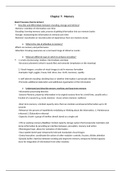Study guide
Psyc 101 final exam study guide
- Course
- Psyc 101 (PSYC101)
- Institution
- University Of British Columbia (UBC )
Concise notes that combine all lectures and textbook readings in one document. Study using this revision guide to save time and be 100% prepared for your exam!
[Show more]



